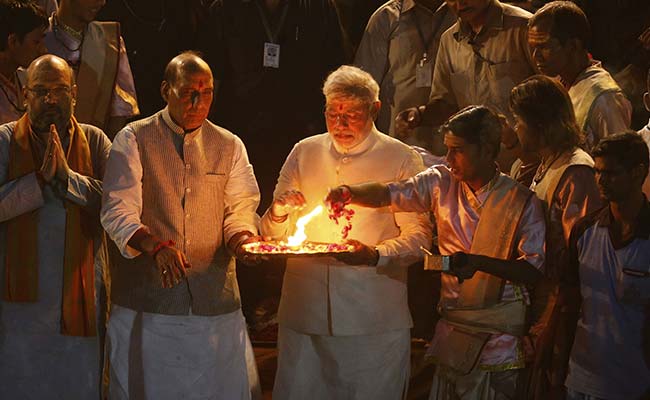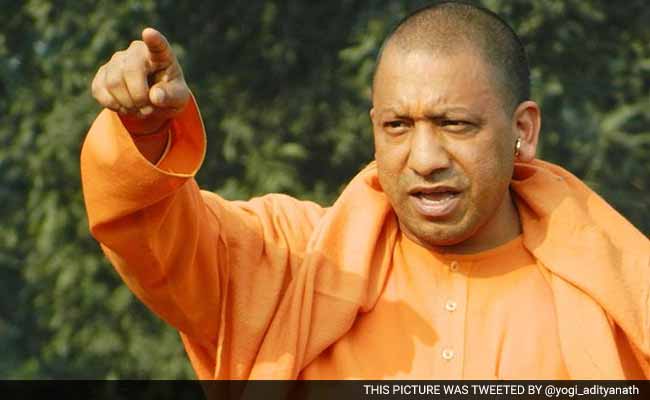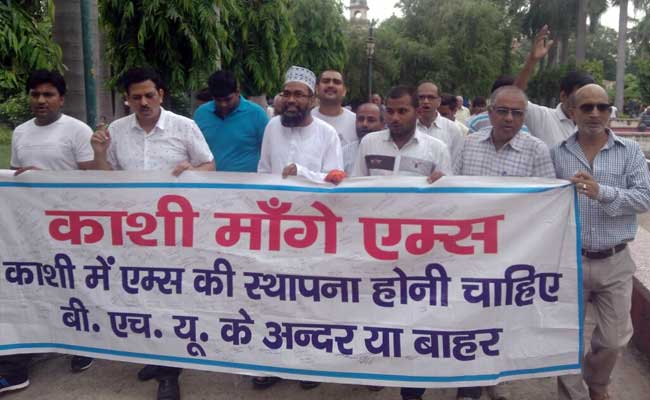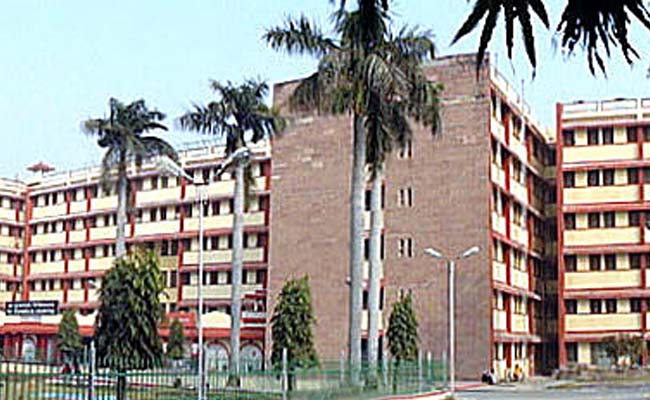
Prime Minister Narendra Modi laid the foundation stone of the AIIMS Gorakhpur last month
- Big new hospital, AIIMS, sanctioned for Gorakhpur in Eastern UP
- Varanasi, which is PM's constituency, was hoping to land AIIMS
- Varanasi home to more people, visitors, deserves AIIMS: doctors
Did our AI summary help?
Let us know.
Varanasi:
Varanasi was struck with a serious case of neighbour's envy last month when its representative in parliament, Prime Minister Narendra Modi, laid the foundation stone for a state-of-the-art hospital in Gorakhpur in Eastern Uttar Pradesh.
Both cities are located in the country's most populated and backward region, Purvanchal, with limited access to super-specialty health care.
The All India Institute of Medical Sciences or AIIMS is a prize that the PM's constituency was counting on - after all, when her Congress party was in power, Sonia Gandhi had got the government to commit to an AIIMS for Rae Bareli, which has elected her to the Lok Sabha since 2004.
So when a full-scale branch of AIIMS in Eastern Uttar Pradesh was highlighted in the government's annual budget last year - with a provision of 1,011 crores - the people of Varanasi assumed their city would be the chosen one.
 But then Gorakhpur was named the benefactor.
But then Gorakhpur was named the benefactor.
R K Chaudhary, heads the Varanasi Vikas Samiti, an independent citizen's body dominated by BJP sympathizers. He says the BJP had no option but to relocate the AIIMS project because Chief Minister Akhilesh Yadav obstructed the project to ensure the PM would not be seen as a pro-development leader; the state government stalled identifying the land that would be allotted for a large hospital, he alleged. "But the Chief Minister wasted no time in identifying 112 acres for the institute in Gorakhpur and is now trying to grab credit for bringing it to Purvanchal ahead of next year's assembly election," he claimed.
But there is a strong counter-view in the ancient city of Kashi. Local BJP leaders say that the AIIMS project became a trade-off between the party and Yogi Adityanath, the five-time parliamentarian from Gorakhpur, and head seer of the Gorakhshnath Peeth, or the leader of one of the biggest Hindu sects. There are allegations that he agreed to tone down his claim to be named the Chief Minister if the BJP wins the election next year; in return, he was able to tell Gorakhpur that he had landed it a huge venture.
 For different reasons, supporters of Mr Yadav, the young Chief Minister, also believe the BJP had a vested interest in picking Gorakhpur over Varanasi. They say that bringing AIIMS to Gorakhpur is the BJP's way of deflecting attention from a large children's hospital that is being built there by the state government. With 500 beds and a budget of 600 crores, the hospital is meant to open by the end of this year ahead of the election - which could score the Chief Minister big points.
For different reasons, supporters of Mr Yadav, the young Chief Minister, also believe the BJP had a vested interest in picking Gorakhpur over Varanasi. They say that bringing AIIMS to Gorakhpur is the BJP's way of deflecting attention from a large children's hospital that is being built there by the state government. With 500 beds and a budget of 600 crores, the hospital is meant to open by the end of this year ahead of the election - which could score the Chief Minister big points.
"Given the size of the children's hospital, what is the need for an AIIMS in Gorakhpur?" asked Dr Om Shankar, a cardiologist at a hospital in Varanasi affiliated to the world-famous Benares Hindu University. Last month, he was among hundreds of doctors, students and political workers across parties who held a street protest demanding that the city get its own AIIMS.
 The leaders of the march offered many reasons for their anger: the population of the holy city is nearly five lakhs more than that of Gorakhpur according to the 2011 census; it attracts a large mass of migrant labour from the 14 districts of Purvanchal; that's in addition to religious pilgrims, international tourists and patients from the neighbouring states of Madhya Pradesh, Chattisgarh, Jharkhand and Bihar. The protestors believe that those in need of medical attention will continue to pour into Kashi because it has better rail, air and road connectivity than Gorakhpur.
The leaders of the march offered many reasons for their anger: the population of the holy city is nearly five lakhs more than that of Gorakhpur according to the 2011 census; it attracts a large mass of migrant labour from the 14 districts of Purvanchal; that's in addition to religious pilgrims, international tourists and patients from the neighbouring states of Madhya Pradesh, Chattisgarh, Jharkhand and Bihar. The protestors believe that those in need of medical attention will continue to pour into Kashi because it has better rail, air and road connectivity than Gorakhpur.
The Sir Sunderlal Hospital affiliated to the Benares Hindu University is the only multi-specialty facility in Eastern Uttar Pradesh and treats more than 15 lakh patients annually despite a 40% shortage of doctors, nurses and technicians. Its new trauma centre was inaugurated by the PM last year, but has just a third of the in-house patients it's meant to because there isn't enough staff.
 "If this is the situation in Kashi, which is a bigger city with better educational institutions, quality of life and linkages to every metropolis in the country, the government will find it impossible to fill the positions in Gorakhpur," professed several doctors who participated in the protest march.
"If this is the situation in Kashi, which is a bigger city with better educational institutions, quality of life and linkages to every metropolis in the country, the government will find it impossible to fill the positions in Gorakhpur," professed several doctors who participated in the protest march.
For instance, the new AIIMS in Gorakhpur is being projected as a major intervention in the battle against Japanese encephalitis, a water-borne virus which kills hundreds of children in this area every year. But for the last seven months, the job of Head Pediatrician in the existing state-run hospital where most patients are treated has remained unfilled.
Salaries at AIIMS set up in cities like Bhopal and Patna are comparable to those offered at AIIMS in Delhi. But there are few takers, which is why several doctors in Gorakhpur and Varanasi believe that instead of creating new hospitals, the money would be better spent on improving existing infrastructure and grass-roots health care in villages.
But when parties have an election to fight, practicalities, even those offered by professionals and stake-holders, don't hold much sway. Instead, it is political costs - and gains - that can affect even the most essential of services - like healthcare.
Both cities are located in the country's most populated and backward region, Purvanchal, with limited access to super-specialty health care.
The All India Institute of Medical Sciences or AIIMS is a prize that the PM's constituency was counting on - after all, when her Congress party was in power, Sonia Gandhi had got the government to commit to an AIIMS for Rae Bareli, which has elected her to the Lok Sabha since 2004.
So when a full-scale branch of AIIMS in Eastern Uttar Pradesh was highlighted in the government's annual budget last year - with a provision of 1,011 crores - the people of Varanasi assumed their city would be the chosen one.

PM Narendra Modi performing the evening arti on the banks of river Ganga, Varanasi. (File photo)
R K Chaudhary, heads the Varanasi Vikas Samiti, an independent citizen's body dominated by BJP sympathizers. He says the BJP had no option but to relocate the AIIMS project because Chief Minister Akhilesh Yadav obstructed the project to ensure the PM would not be seen as a pro-development leader; the state government stalled identifying the land that would be allotted for a large hospital, he alleged. "But the Chief Minister wasted no time in identifying 112 acres for the institute in Gorakhpur and is now trying to grab credit for bringing it to Purvanchal ahead of next year's assembly election," he claimed.
But there is a strong counter-view in the ancient city of Kashi. Local BJP leaders say that the AIIMS project became a trade-off between the party and Yogi Adityanath, the five-time parliamentarian from Gorakhpur, and head seer of the Gorakhshnath Peeth, or the leader of one of the biggest Hindu sects. There are allegations that he agreed to tone down his claim to be named the Chief Minister if the BJP wins the election next year; in return, he was able to tell Gorakhpur that he had landed it a huge venture.

Yogi Adityanath is five-time parliamentarian from Gorakhpur and head seer of the Gorakhshnath Peeth
"Given the size of the children's hospital, what is the need for an AIIMS in Gorakhpur?" asked Dr Om Shankar, a cardiologist at a hospital in Varanasi affiliated to the world-famous Benares Hindu University. Last month, he was among hundreds of doctors, students and political workers across parties who held a street protest demanding that the city get its own AIIMS.

BHU doctors during a march last week, demanding establishment of an All India Institute of Medical Sciences (AIIMS) in Varanasi
The Sir Sunderlal Hospital affiliated to the Benares Hindu University is the only multi-specialty facility in Eastern Uttar Pradesh and treats more than 15 lakh patients annually despite a 40% shortage of doctors, nurses and technicians. Its new trauma centre was inaugurated by the PM last year, but has just a third of the in-house patients it's meant to because there isn't enough staff.

The Sir Sunderlal Hospital is the only multi-specialty facility in Eastern Uttar Pradesh.
For instance, the new AIIMS in Gorakhpur is being projected as a major intervention in the battle against Japanese encephalitis, a water-borne virus which kills hundreds of children in this area every year. But for the last seven months, the job of Head Pediatrician in the existing state-run hospital where most patients are treated has remained unfilled.
Salaries at AIIMS set up in cities like Bhopal and Patna are comparable to those offered at AIIMS in Delhi. But there are few takers, which is why several doctors in Gorakhpur and Varanasi believe that instead of creating new hospitals, the money would be better spent on improving existing infrastructure and grass-roots health care in villages.
But when parties have an election to fight, practicalities, even those offered by professionals and stake-holders, don't hold much sway. Instead, it is political costs - and gains - that can affect even the most essential of services - like healthcare.
Track Latest News Live on NDTV.com and get news updates from India and around the world

